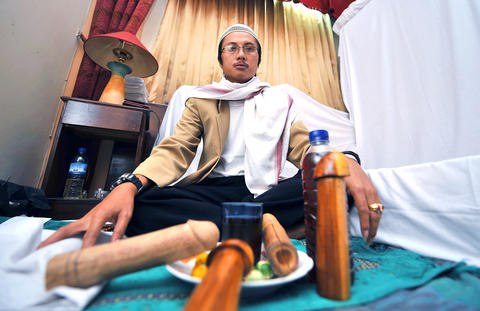Three large wooden penises lie on a colorful batik prayer mat in the house of Mak Erot, Indonesia's legendary lengthener of male members, inviting customers to pick their new look.
Mak Erot, the undisputed national expert in solving the self-image problems of Indonesian men, seems to have disappeared a long time ago but many believe she is still working her magic, perhaps from beyond the grave.
The craggy, betel nut-chewing woman with a distinctive brown birthmark on her cheek has spawned legions of imitators, while her legitimate heirs are keen to keep up the facade that she's alive lest business die with her.

PHOTO :AP
And it is a booming business - as a glance at the classified pages of any Indonesian tabloid newspaper will attest, packed as they are with ads for "penile paranormals" all claiming to have been trained by Mak Erot.
Jakarta, the nation's capital, even has a Mak Erot "clinic."
She has made it into popular culture too, with the film Extra Large: Between Me, You and Mak Erot currently playing in cinemas.
Mak Erot's village of Caringin is at the end of a road that winds along the Indian Ocean coast in southwestern Java. Her white house sits in a region where farmers from Indonesia's Sundanese culture incorporate their ancient animistic beliefs with Islam.
As expected, the disciples at Mak Erot's house say she's still alive.
"Mak Erot went to open an office in Medan (North Sumatra)," says a young man wearing a traditional Muslim beanie. "She's in a good shape. She still can walk."
He introduces himself as Haji Baban, Mak Erot's grandson, an heir of the old woman's esoteric powers and expertise in rare plants.
"People from all over the world come here, from Arab countries, from China, Singapore, Korea, Malaysia, Taiwan," he says.
"They want solutions to impotence or premature ejaculation, they ask to have a longer penis."
According to the daily Kompas, Mak Erot passed on her "science" to her five children and sixteen grandchildren who account for her 21 true heirs, a select order of masters of male enhancement.
A consultation with Haji Baban is an encounter with the arcane. Sitting cross-legged in semi-darkness, the patient is asked to detail his wishes with the visual aid of a selection of carved wooden phalluses.
Then comes the diagnosis, delivered after a contemplative silence.
Solemnly, Haji Baban intones that the client's appendage is "fairly average," and offers to conjure up a 6cm extension.
The prescription for such whopping growth is a 10-day course of eating and drinking mystery concoctions and secret potions, with the first dose of bitter berries to be taken immediately, washed down with dark brown liquid.
An assistant then brings a phallus shaped bamboo tube containing a roll of sticky coconut rice that has to be swallowed whole to avoid what Haji Baban describes ominously as "terrible genital consequences."
Haji Baban ends the consultation with a vegetable oil that the client must promise to apply daily with a specific hand action from base to tip. And no eating green bananas or citronella, he orders.
The daily cost for treatment is between US$70 and US$100, depending on the options selected.
This is a hefty sum for many in Indonesia but the imposing mansions being built around Caringin seem to indicate that plenty of men are willing to pay.
A local motorcycle taxi driver gestures to the newly built homes and says: "They belong to Mak Erot."

In the March 9 edition of the Taipei Times a piece by Ninon Godefroy ran with the headine “The quiet, gentle rhythm of Taiwan.” It started with the line “Taiwan is a small, humble place. There is no Eiffel Tower, no pyramids — no singular attraction that draws the world’s attention.” I laughed out loud at that. This was out of no disrespect for the author or the piece, which made some interesting analogies and good points about how both Din Tai Fung’s and Taiwan Semiconductor Manufacturing Co’s (TSMC, 台積電) meticulous attention to detail and quality are not quite up to

April 21 to April 27 Hsieh Er’s (謝娥) political fortunes were rising fast after she got out of jail and joined the Chinese Nationalist Party (KMT) in December 1945. Not only did she hold key positions in various committees, she was elected the only woman on the Taipei City Council and headed to Nanjing in 1946 as the sole Taiwanese female representative to the National Constituent Assembly. With the support of first lady Soong May-ling (宋美齡), she started the Taipei Women’s Association and Taiwan Provincial Women’s Association, where she

It is one of the more remarkable facts of Taiwan history that it was never occupied or claimed by any of the numerous kingdoms of southern China — Han or otherwise — that lay just across the water from it. None of their brilliant ministers ever discovered that Taiwan was a “core interest” of the state whose annexation was “inevitable.” As Paul Kua notes in an excellent monograph laying out how the Portuguese gave Taiwan the name “Formosa,” the first Europeans to express an interest in occupying Taiwan were the Spanish. Tonio Andrade in his seminal work, How Taiwan Became Chinese,

Mongolian influencer Anudari Daarya looks effortlessly glamorous and carefree in her social media posts — but the classically trained pianist’s road to acceptance as a transgender artist has been anything but easy. She is one of a growing number of Mongolian LGBTQ youth challenging stereotypes and fighting for acceptance through media representation in the socially conservative country. LGBTQ Mongolians often hide their identities from their employers and colleagues for fear of discrimination, with a survey by the non-profit LGBT Centre Mongolia showing that only 20 percent of people felt comfortable coming out at work. Daarya, 25, said she has faced discrimination since she